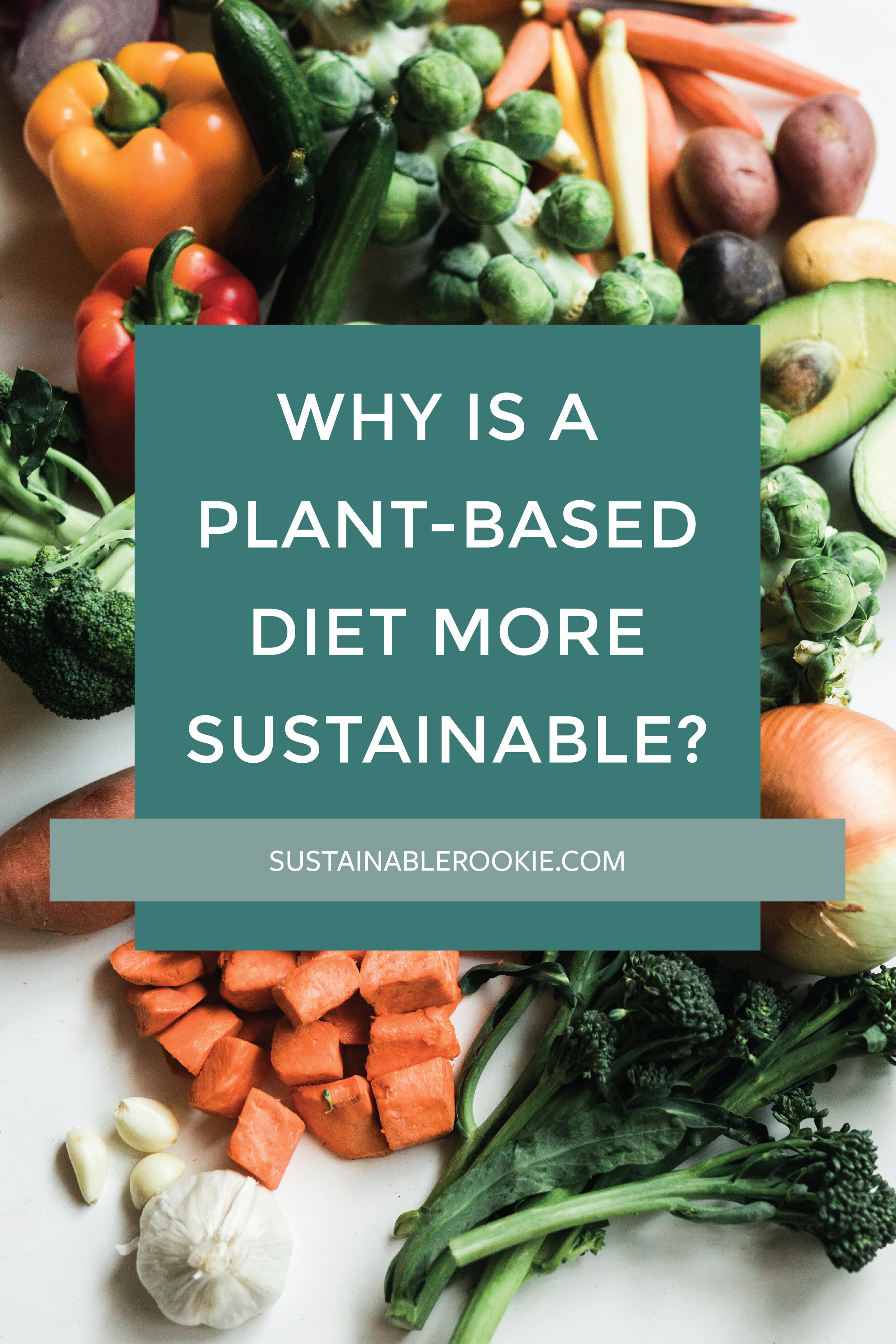Why Is a Plant-Based Diet More Sustainable?
There’s a reason why I have a vegan section on a conscious-living blog. I’ve already discussed why sustainability is important on a previous post, and vegan and plant-based diets are an inherent part of Sustainability.
I became a vegetarian for ethical reasons, and immediately learned about the environmental impact of consuming animal products. Years later, when I moved to the U.S. and saw so many vegan products in the supermarket, I started wondering why some people choose to be vegan, something I hadn’t asked myself before, as it was a somehow unconceivable concept back in Argentina.
During this educational period, I learned that it wasn’t just about eating animals, but also about the other animal-derived products that had appeared innocuous to me, like eggs and milk. These too are a result of animal cruelty–the methods used to produce them and the convenient belief that animals are ours to use and exploit, mere sources of production–but they also take a huge toll on the environment.
Why is this so? How can switching diets impact on the environment? In this post I’ll explain the benefits of a plant-based diet for the environment.
WHAT IS A PLANT-BASED DIET
A plant-based diet is a diet that consists mostly of plants, which includes not only fruits and vegetables, but also legumes, grains, beans, nuts, oils, seeds. It excludes animal products like milk, meat, fish, eggs, honey, among others.
WHAT IS THE DIFFERENCE BETWEEN A PLANT-BASED DIET AND A VEGAN DIET?
Even though I’m a vegan, and therefore follow a vegan diet, in this post I’ll talk about a plant-based diet. Specially because this blog aims to promote action without imposing perfection, a plant-based diet might be the best option for most. It’s not about what I believe–in that case I’d always promote being vegan–but about what’s the most approachable solution for the most amount of people, not just a few, which will make a bigger difference.
Both diets consist of plants, as the ones I listed above. They could include processed foods, in contrast to a whole-food plant-based diet–which is another version of the plant-based diet–as it consists of natural, unprocessed, and unrefined foods focused primarily on nutritional needs.
While a vegan diet in no way includes meat, seafood, eggs, dairy, or anything that has derived from an animal, a plant-based diet avoids them. Their meals consist mostly of plants but could include animal products every now and then.
There are different reasons why people choose a plant-based or vegan diet, from animals to health. In this post I’ll focus on the benefits of a vegan diet regarding the environment.
WHY IS A PLANT-BASED DIET MORE SUSTAINABLE?
Animal products have a negative impact on the environment, mainly from resources used to feed those animals. Keeping them–crops, water, land–and transporting them place a heavy burden on the environment, not only from CO2 released by transportation, but from other gases released during the process. It’s also a contributor to deforestation, which leads to habitat loss, displacement, and more animal deaths.
Water
According to the United Nations World Water Development Report 2021, fresh water is becoming scarcer than it already is. The world will face a global water deficit of 40% by 2030, which will be worsened by global challenges, including climate change.
The mentioned report affirms that, in recent decades, food production has heavily intensified in many developed and rapidly growing economies striving for food security, and thus there has also been an intensification of high levels of agrochemicals used to maximize crop yields, as well as a significant increase in livestock production. This results in high nutrient loads, which degrades downstream water quality and eutrophicates water bodies. In addition to this, slurry from cattle and other livestock pollutes groundwater, rivers, and streams, as they contain high levels of nitrogen and phosphor.
Although there are different reports that present variations in the amount of water used to produce 1 pound of meat, and the numbers can vary by production region or feed composition, the conclusion always leans towards meat needing at least 3 times as much water as plants.
Professor Arjen Y. Hoekstra–a professor of Water Management at the University of Twente–and the United States Geological Survey (USGS) agree that it takes nearly 2,000 gallons of water to produce just one pound of beef. A pound of poultry takes 500 gallons. In contrast, corn and potatoes require 110 and 100 gallons respectively to produce 1 pound. It can be concluded that for the same amount of water, we can produce twenty times more potatoes than beef. An acre of land can sustain enough cows to produce approximately 250 pounds of beef, whereas the same acre can produce nearly 20,000 pounds of potatoes, and 50,000 of tomatoes.
Farmed animals consume more protein and water than they yield. Arable land must be irrigated to be able to grow crops, which is used to feed livestock, instead of being directly consumed by people. Raising livestock for food uses water to maintain the land to feed the animals, as well as the water the animal consumes directly. Cows drink 9 times as much water and 7 times as much food as all humans together. We’re talking about at least 79 billion animals that are kept and killed each year.
A IWMI report states that meat-eaters consume the equivalent of about 1,100 gallons of water a day, compared to the 200-500 gallons used by vegetarians.
According to the UNESCO Institute for Water Education, a vegetarian diet can reduce the water footprint of an individual by as much as 58%. This number increases with a plant-based diet.
Another report by the Stockholm International Water Institute, states that 95% of our calories must be obtained from plant-based foods by 2050 to avoid catastrophic food and water shortages.
It’s said that not eating 1 pound of meat saves more water than not taking a shower for 6 months!
Air
On the other hand, the animal industry releases a big percentage of gases responsible for global warming into the air.
A study published in Science reveals that the meat, aquaculture, eggs, and dairy industry use 83% of the world’s farmland and contribute 56 to 58% of food’s different emissions, despite providing only 37% of our protein and 18% of our calories.
Carbon dioxide is produced from high-energy feed, fueling factory farms, processing and packaging, deforestation, transporting animals, feed crop cultivation, and desertification.
Methane is released by some animals during digestion and by manure as it decomposes, and it’s 20 times more powerful at trapping heat in earth’s atmosphere than Co2. The U.S. Environmental Protection Agency claims that when livestock and manure emissions are combined, the agriculture sector is the largest source of CH4 emissions in the United States.
Nitrous oxide is a significant contributor to global warming, and it’s 300 times more powerful at trapping heat in the atmosphere than Co2. According to the U.N., the livestock sector–including the meat, egg, and dairy industries–generates a 65% of human-related nitrous oxide emissions.
Factory farms also produce massive amounts of dust and other contaminates that pollute the air. A study from Consumers Union SWRO in Texas found that some animal feedlots produce at least 7,000 tons of inhalable small particulates in a year, containing biologically active organisms such as bacteria, mold, fungi from the feces and the feed, which pose a great health hazard. The Environmental Protection Agency (EPA) reports that more than 80% of ammonia emissions in the U.S. come from animal waste.
A research published in the journal Science and Researchers at the University of Oxford found found that a plant-based diet reduces food’s emissions by up to 73%, not only in greenhouse emissions, but also acidifying and eutrophying emissions which degrade terrestrial and aquatic ecosystems.
Researchers from the University of Michigan and Tulane University published a study that concluded that if Americans who eat an animal-heavy diet changed them gradually to a plant-based diet, the one-day reduction of greenhouse gas emissions would be equal to eliminating 661 million passenger-vehicle miles. Harvard’s School of Public Health has also rooted for a vegan or plant-based diet to help the environment and health.
Land
A major issue that the animal industry presents is the use of land–to place the animals, in addition to the land used to grow the crops they’re fed. Food grown to feed the more than 79 billion animals that are raised, kept, and killed for food each year, could be consumed directly by the 7.9 billion humans in the world.
Livestock farming degrades land and water, and contributes to deforestation, as 30% of land in the world is used either for livestock or to grow grain to feed them, according to a study by Scientific Reports. This is approximately an area the size of Asia. Scientists at the Smithsonian Institution argue that 7 football fields’ worth of land is bulldozed every minute to create room for farmed animals and the crops that are used to feed them.
According to the USDA, over 70% of the soybeans grown in the U.S. are used for animal feed, with poultry being the number one livestock sector consuming soybeans, followed by hogs, dairy, beef, and aquaculture.
Land availability is going to be one of the most important problems in upcoming years, especially with a forecasted growing population in the next decades. The limited viable agricultural land is going to keep on decreasing with global warming.
Moving to a plant-based diet would reduce the amount of land needed to grow crops by 35-50% (a study by the University of Oxford suggests a 76%), saving 72 million acres of crop land, 6.6 billion pounds of nitrogen fertilizer, and 280 million metric tons of carbon dioxide per year in the U.S.
Ethics
Beyond environmental impact (everything mentioned above, in addition to threatening plant species and wildlife because of deforestation and overall environmental damages), which this blog focuses on, the ethical aspect of eating animals comes into discussion. Not only eating animals or animal-derived products is considered unethical for several reasons, but the animal agriculture industry also takes a huge toll on undeveloped countries.
It’s mostly impoverished populations that grow crops for animals to feed, which could be used to feed them directly. Moreover, this means that water is used to keep those crops in countries where water is already scarce.
Water pollution, deforestation (Yale estimates an 80% of rainforest loss in the Amazon is a consequence of clearing land for cattle), inefficient use of resources, and global warming in general, impact mostly the poorest countries.
Another side of the coin comes into light with a report by the California State Senate, which explains that animal waste emits toxic airborne chemicals that can cause inflammatory, immune irritation and neurochemical problems in humans.
WHAT CAN WE DO? SHOULD WE START A PLANT-BASED DIET TO BE MORE SUSTAINABLE?
The benefits veganism has are undeniable, but hoping everyone will turn vegan from one day to the other doesn’t help. The most realistic approach is to slowly transition to a plant-based diet, or to a full vegan diet if it’s possible. Consuming mainly whole-foods and buying locally are also ways of consuming more consciously.
This should be a responsibility of the most developed countries and the upper social classes, who not only have more resources (both financial and informational), but also greater availability of alternative products than marginalized countries.
If you’d like to know more about plant-based and vegan diets, and read my future posts, please don’t forget to subscribe to my newsletter!





